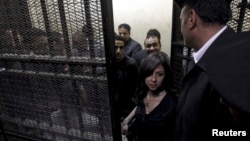CAIRO —
The U.N.'s human rights chief said on Wednesday Egypt risked betraying the ideals behind the 2011 revolution and slipping into authoritarianism with a new civil society law.
The Arab country is at a "critical moment" more than two years after the uprising that ousted autocratic President Hosni Mubarak, U.N. High Commissioner for Human Rights Navi Pillay said, citing a range of social and political rights concerns.
She singled out a law backed by the Muslim Brotherhood's Freedom and Justice Party (FJP) that she said risked making non-governmental organizations (NGOs) worse off than they were under Mubarak by imposing curbs including funding restrictions.
The draft law being discussed in the FJP-led parliament also requires prior approval for many activities and has been criticized for posing a threat to people's freedom to gather in a common cause or interest.
"This current draft law ... risks placing civil society under the thumb of security ministries which have a history of abusing human rights and an interest in minimizing scrutiny," Pillay said in a statement.
FJP leaders have said the bill is still under discussion and that it will give NGOs freedom and meet the needs of society. Brotherhood and presidency spokespeople did not respond to phone and email requests for comment on Pillay's statement.
Civil society groups faced funding constraints under Mubarak, and restrictions on them have continued to create tensions with Western countries that help finance NGOs even after his fall.
Last year an investigation into the work of international NGOs, including some U.S.-based groups, led to a crisis in ties between Cairo and Washington during the rule of army generals who temporarily took over from Mubarak.
Press Freedoms
Pillay said Egypt needed a clear framework for civil society to organize and work, and that governments who tried to constrain such activities "risk slipping quickly into authoritarianism, even if that is not their initial intention."
She also listed concerns including Egypt's contentious new constitution, the impunity of security forces implicated in abuses, lawsuits against journalists and activists and "apparent efforts" to limit the authority of the judiciary.
Separately on Wednesday, Egypt's public prosecutor charged two journalists with "publishing false news that aims to disturb public peace and stir panic."
Magdi El Galad, editor of the daily El-Watan newspaper, and Ahmed el-Khatib, one of the paper's reporters, were charged after the paper published the names of people Islamist militants had allegedly planned to assassinate.
Several journalists, talk show hosts and comedians have been charged with defamation over the last few months, leading activists to accuse Egyptian President Mohamed Morsi and the Brotherhood of trying to stifle their critics - something they deny.
Heba Morayef, Egypt director at New York-based Human Rights Watch, said the Mubarak-era penal code, which attaches criminal charges to libel cases, was too restrictive and should be amended.
"Locking up journalists is not good for democracies in general,'' she said.
The Arab country is at a "critical moment" more than two years after the uprising that ousted autocratic President Hosni Mubarak, U.N. High Commissioner for Human Rights Navi Pillay said, citing a range of social and political rights concerns.
She singled out a law backed by the Muslim Brotherhood's Freedom and Justice Party (FJP) that she said risked making non-governmental organizations (NGOs) worse off than they were under Mubarak by imposing curbs including funding restrictions.
The draft law being discussed in the FJP-led parliament also requires prior approval for many activities and has been criticized for posing a threat to people's freedom to gather in a common cause or interest.
"This current draft law ... risks placing civil society under the thumb of security ministries which have a history of abusing human rights and an interest in minimizing scrutiny," Pillay said in a statement.
FJP leaders have said the bill is still under discussion and that it will give NGOs freedom and meet the needs of society. Brotherhood and presidency spokespeople did not respond to phone and email requests for comment on Pillay's statement.
Civil society groups faced funding constraints under Mubarak, and restrictions on them have continued to create tensions with Western countries that help finance NGOs even after his fall.
Last year an investigation into the work of international NGOs, including some U.S.-based groups, led to a crisis in ties between Cairo and Washington during the rule of army generals who temporarily took over from Mubarak.
Press Freedoms
Pillay said Egypt needed a clear framework for civil society to organize and work, and that governments who tried to constrain such activities "risk slipping quickly into authoritarianism, even if that is not their initial intention."
She also listed concerns including Egypt's contentious new constitution, the impunity of security forces implicated in abuses, lawsuits against journalists and activists and "apparent efforts" to limit the authority of the judiciary.
Separately on Wednesday, Egypt's public prosecutor charged two journalists with "publishing false news that aims to disturb public peace and stir panic."
Magdi El Galad, editor of the daily El-Watan newspaper, and Ahmed el-Khatib, one of the paper's reporters, were charged after the paper published the names of people Islamist militants had allegedly planned to assassinate.
Several journalists, talk show hosts and comedians have been charged with defamation over the last few months, leading activists to accuse Egyptian President Mohamed Morsi and the Brotherhood of trying to stifle their critics - something they deny.
Heba Morayef, Egypt director at New York-based Human Rights Watch, said the Mubarak-era penal code, which attaches criminal charges to libel cases, was too restrictive and should be amended.
"Locking up journalists is not good for democracies in general,'' she said.












